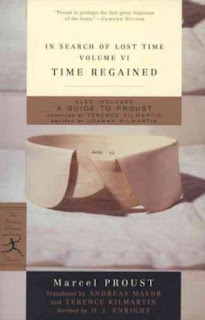Book Review: In Search of Lost Time: Time Regained
by David Blake, Fiction Department, Central Library
In Search of Lost Time: Time Regained
Marcel Proust
For those of us who have begun our third act, time is a mystery. We are no longer the same person we were when we were young. Places change beyond recognition. Everyday devices we took for granted, like rotary phones, have disappeared altogether. Over the years, the great bulk of the past grows ever larger, yet becomes less vivid in our minds.
Time Regained, the last volume of In Search of Lost Time, was, largely, written at the same time as Swann’s Way, but was only completed posthumously. Marcel Proust’s masterpiece consumed the last decade and a half of his life. He knew it would. In Time Regained Proust tells us how he came to the insights that led his dedicating all his remaining asthmatic breaths to his work, in a dark room shut up against dust and pollen that could lead to his suffocation.
Time Regained has a simple structure. Like Swann’s Way, it has three major parts: it is set before, during, and after the Great War. In the first part, the narrator returns to the village of his youth, Cambrai, to visit the love of his youth, Gilberte, and they walk the rural lanes that had great symbolic significance for the Narrator as a boy. In the last, post-war section of the book the sickly Narrator re-enters aristocratic society after many years and is astonished at the changes wrought by time.
The middle portion of the book is given to scenes from World War I Paris. We are accustomed to black and white newsreel images of World War II London during the blitz, but it is a shock to encounter similar images conjured in our minds of a ravaged Paris, which was within artillery range for the Germans throughout World War I. The City of Light was blacked out. Savagery and destruction reigned in the streets. Parisian society was upside down, crass, and made repulsive by war.
By the end of the book, the Narrator, who knew himself to be an artist but who had never found his purpose, is inspired to write about the effects of time. Friends and acquaintances whom he knew to be silly and vain, gain grandeur when apprehended in time. The Narrator, always alert to unbidden memories, comes to understand that the past revealed through unbidden memory is more vivid than original direct experiences because we, especially if we are artists, can infuse these memories with our imaginations. Thus, for example, the whole village of Combrai, as it existed in the Narrators youth, can come alive again with just a sip of tea and the nibbled corner of a madeleine cookie.
In Search of Lost Time: Time Regained
Marcel Proust
For those of us who have begun our third act, time is a mystery. We are no longer the same person we were when we were young. Places change beyond recognition. Everyday devices we took for granted, like rotary phones, have disappeared altogether. Over the years, the great bulk of the past grows ever larger, yet becomes less vivid in our minds.
Time Regained, the last volume of In Search of Lost Time, was, largely, written at the same time as Swann’s Way, but was only completed posthumously. Marcel Proust’s masterpiece consumed the last decade and a half of his life. He knew it would. In Time Regained Proust tells us how he came to the insights that led his dedicating all his remaining asthmatic breaths to his work, in a dark room shut up against dust and pollen that could lead to his suffocation.
Time Regained has a simple structure. Like Swann’s Way, it has three major parts: it is set before, during, and after the Great War. In the first part, the narrator returns to the village of his youth, Cambrai, to visit the love of his youth, Gilberte, and they walk the rural lanes that had great symbolic significance for the Narrator as a boy. In the last, post-war section of the book the sickly Narrator re-enters aristocratic society after many years and is astonished at the changes wrought by time.
The middle portion of the book is given to scenes from World War I Paris. We are accustomed to black and white newsreel images of World War II London during the blitz, but it is a shock to encounter similar images conjured in our minds of a ravaged Paris, which was within artillery range for the Germans throughout World War I. The City of Light was blacked out. Savagery and destruction reigned in the streets. Parisian society was upside down, crass, and made repulsive by war.
By the end of the book, the Narrator, who knew himself to be an artist but who had never found his purpose, is inspired to write about the effects of time. Friends and acquaintances whom he knew to be silly and vain, gain grandeur when apprehended in time. The Narrator, always alert to unbidden memories, comes to understand that the past revealed through unbidden memory is more vivid than original direct experiences because we, especially if we are artists, can infuse these memories with our imaginations. Thus, for example, the whole village of Combrai, as it existed in the Narrators youth, can come alive again with just a sip of tea and the nibbled corner of a madeleine cookie.

Comments